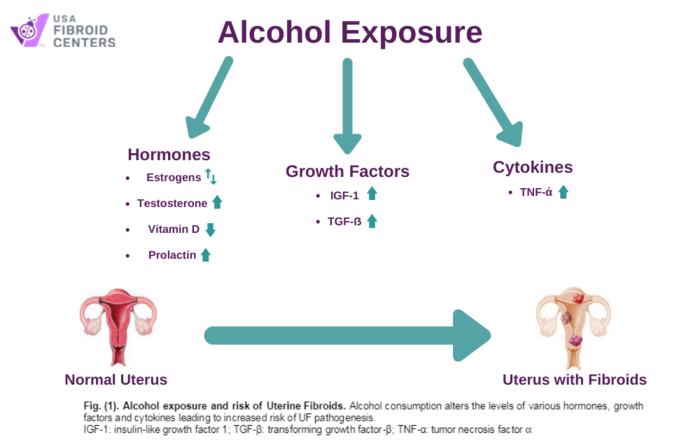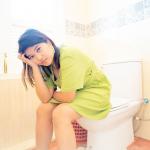
If you have fibroids, you may be concerned about the impact that drinking alcohol might have on their growth. Research into the effects of alcohol on fibroid development is still ongoing, but there is evidence to suggest that alcohol consumption may contribute to both the development and growth of fibroids, particularly in women who are already at risk.² For women who already have fibroids, it’s important to consider how alcohol might impact symptom management.
SYMPTOMS CAUSED BY FIBROIDS? TAKE THE QUIZ
The Relationship Between Fibroids and Alcohol Consumption
Before discussing the link between alcohol and fibroids, it’s important to understand what fibroids are. Uterine fibroids are benign tumors that grow from the muscle tissue of the uterus. While the exact cause of fibroids is still not fully understood, hormones such as estrogen and progesterone are believed to play a significant role in their growth. Genetics, age, and race also impact the likelihood of developing fibroids, with African-American women being more likely to experience them and at an earlier age.
Fibroids can vary in size and may cause symptoms like:
- Heavy or painful periods
- Frequent urination
- Pelvic pain or pressure
- Back pain
- Pain during sex
However, many women with fibroids may experience no symptoms at all.
While more research is needed to fully understand the impact of alcohol on fibroids, it’s clear that alcohol can play a role in both the development and exacerbation of these benign tumors. By influencing hormonal levels, increasing inflammation, and contributing to weight gain, alcohol can create an environment that promotes fibroid growth or worsens symptoms.
1. Hormonal Influence
Estrogen, a key hormone in the body, is one of the primary drivers behind fibroid growth. Alcohol can affect estrogen levels in a number of ways. For one, alcohol increases the body’s production of estrogen, which may stimulate the growth of fibroids. High levels of estrogen have been shown to increase the size of existing fibroids or contribute to the development of new ones.
Alcohol can also interfere with the liver’s ability to metabolize estrogen. The liver plays a crucial role in breaking down excess estrogen in the body, and alcohol consumption can impair liver function, leading to higher estrogen levels. This hormonal imbalance may create an environment that favors fibroid growth.
2. Increased Risk of Inflammation
Alcohol is known to contribute to inflammation in the body, particularly when consumed in excess. Chronic inflammation is believed to be one of the factors that can stimulate the growth of fibroids. When the body is inflamed, it produces higher amounts of certain substances, such as prostaglandins, that can promote the growth of tumors, including fibroids.
Fibroids themselves can also cause inflammation in the uterine tissue, which may exacerbate symptoms like pelvic pain and pressure. Drinking alcohol could add to this problem by promoting further inflammation, leading to an increased risk of fibroid complications.
3. Obesity and Alcohol Consumption
Obesity is another factor linked to fibroids, and alcohol can contribute to weight gain. Alcoholic beverages are high in calories, and heavy drinking can lead to an increase in body fat, which in turn can elevate estrogen levels. Excess fat tissue produces additional estrogen, which can worsen fibroid growth. In this way, alcohol indirectly exacerbates the risk of fibroids by contributing to obesity and the hormonal imbalance it creates.
4. Impact on Menstrual Health
Heavy alcohol consumption is known to disrupt the menstrual cycle. It can lead to irregular periods, heavier bleeding, or longer menstrual cycles. These disturbances in menstrual health may worsen the symptoms of fibroids, especially if the fibroids are already causing heavy periods and discomfort. The hormonal changes associated with alcohol may further exacerbate these symptoms, leading to more severe issues for those who already have fibroids.
FAQs About Alcohol and Fibroids
If you have fibroids or are experiencing fibroid-like symptoms, you may have questions about the relationship between alcohol and fibroids. Here are answers to some of the more common questions about fibroids and alcohol consumption.
Does Alcohol Affect Fibroids?
If you have larger fibroids, you might be more susceptible to increased pain and discomfort after drinking alcohol. Some women report experiencing worsened fibroid symptoms women such as:
- Heavy bleeding
- Cramping
- Pelvic pain
- Bloating
- Increased urinary frequency
This could be due to dehydration, inflammation, or hormonal changes triggered by alcohol consumption.5
Research suggests a link between alcohol consumption and the growth and symptoms of fibroids.6 If you have or are at risk of fibroids, you may want to discuss this with your doctor to understand how alcohol might affect you.
How Does Alcohol Make Fibroids Worse?
Emerging research suggests an association between consumption and the growth and symptoms of fibroids Alcohol dehydrates the body, and research suggests it may negatively affect your hormones and endocrine system,7 aggravating any fibroid symptoms. Drinking too much alcohol can also interfere with hormone production in the body.8
Fibroids tend to grow when hormone levels are high, such as during pregnancy. After childbirth or menopause, fibroids often shrink. If alcohol consumption results in excessive hormones in the body, fibroid growth may occur.
Schedule Your Consultation With USA Fibroid Centers Today
USA Fibroid Centers’ leading fibroid specialists offer UFE at dozens of state-of-the-art center locations nationwide. Book your appointment today, or call 855.615.2555 for more information.
References
- “Drinking Too Much Alcohol Can Harm Your Health. Learn the Facts,” Centers for Disease Control and Prevention, April 14, 2022
- Hajra Takala et al., “(PDF) Alcohol Consumption and Risk of Uterine Fibroids,” ResearchGate, October 2019, https://www.researchgate.net/publication/336548122_Alcohol_Consumption_and_Risk_of_Uterine_Fibroids.
- 1. Lauren A. Wise et al., “Risk of Uterine Leiomyomata in Relation to Tobacco, Alcohol and Caffeine Consumption in the Black Women’s Health Study,” OUP Academic, August 1, 2004, https://academic.oup.com/humrep/article/19/8/1746/2356298.
- 1. A.A. D’Aloisio and D.D. Baird, “Variation in the Association of Alcohol Intake with Uterine Fibroids by Race and Tumor Size,” Annals of Epidemiology, September 9, 2004, https://www.sciencedirect.com/science/article/abs/pii/S1047279704002145.
- 1. Dipak Sarkar, M. Katherine Jung, and H. Joe Wang, “Alcohol and the Immune System,” Alcohol Research : Current Reviews, 2015, https://www.ncbi.nlm.nih.gov/pmc/articles/PMC4590612/.
- Monia Orciani et al., “Chronic Inflammation May Enhance Leiomyoma Development by the Involvement of Progenitor Cells,” Stem Cells International 2018 (January 1, 2018): 1–13, https://doi.org/10.1155/2018/1716246.
- Nadia Rachdaoui and Dipak K. Sarkar, “Pathophysiology of the Effects of Alcohol Abuse on the Endocrine System,” Alcohol Research : Current Reviews 38, no. 2 (2017): 255–76, https://www.ncbi.nlm.nih.gov/pmc/articles/PMC5513689/
- Nadia Rachdaoui and Dipak K. Sarkar, “Effects of Alcohol on the Endocrine System,” Endocrinology and Metabolism Clinics of North America 42, no. 3 (September 2013): 593–615, https://doi.org/10.1016/j.ecl.2013.05.008.




